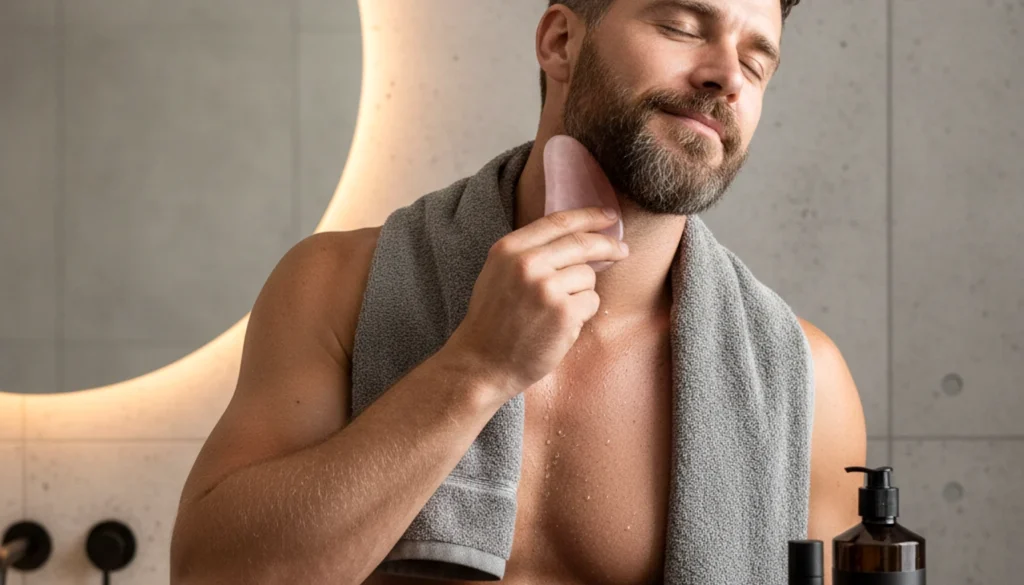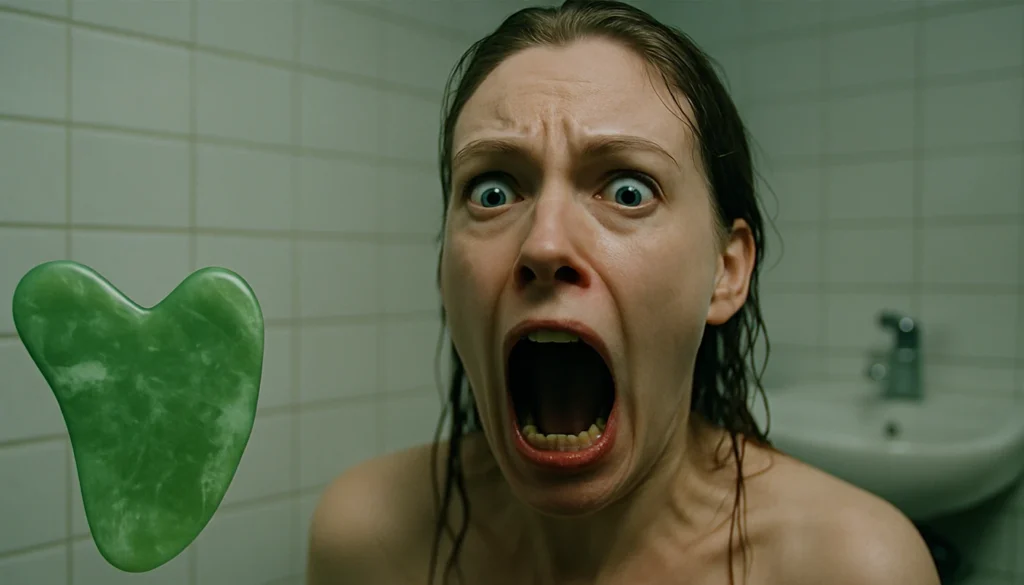Gua Sha in the Shower is a rising social-media trend, with many recommending the practice during a hot shower to “speed results” and “open pores.” As a Gua Sha Tool Manufacturer, we investigated the safety and scientific evidence behind this approach by reviewing the literature.
The consensus: combining mechanical scraping with a hot, humid shower can increase the risk of dizziness, excessive bruising, and skin barrier compromise, while undermining the therapeutic goals of Gua Sha. This guide explains why, dispels common myths, outlines long-term risks, and offers a safe, expert-reviewed protocol.

Table of Contents
What Gua Sha really does (TCM perspective and clinical evidence)
Traditionally, Gua Sha is a therapeutic technique intended to:
- Promote circulation of Qi and blood and relieve stagnation (classical TCM texts).
- Facilitate elimination of pathogenic factors through transient petechiae (“Sha”).
- Release myofascial tension and improve range of motion.
Contemporary studies show measurable physiological responses after scraping: local increases in microcirculation, modulation of the immune response, and soft-tissue mobilization that can reduce pain . Because Gua Sha temporarily alters capillary integrity and affects superficial skin barriers, the environment during and after treatment materially affects safety and outcomes.
Why the shower is unsafe for Gua Sha
TCM-informed reasoning: dampness and heat exposure
In TCM practice, therapies that “open” channels or create Sha leave meridians relatively vulnerable for a short period. Licensed TCM reviewers explain that exposing these opened channels to external damp heat (such as a hot, steamy shower) can promote retention of pathogenic damp-heat and negate the intended clearing effect. Clinically, this is described as an increased tendency toward heaviness, lingering aches, and a “damp-heat” constitution when such exposure is habitual (classical sources: Huang Di Nei Jing; Zhen Jiu Jia Yi Jing).
Biomedical reasoning: circulation, bruising risk, and fall hazards
Modern physiology provides additional, evidence-backed cautions:
- Amplified vasodilation: Gua Sha increases local blood flow. Hot showers cause systemic vasodilation. Together, these effects can lead to exaggerated blood pooling or transient hypotension, provoking dizziness or fainting—particularly in people prone to low blood pressure or who are dehydrated.
- Increased bruising and capillary fragility: Heat and humidity make capillary walls more permeable, raising the likelihood of deep or prolonged petechiae and bruises after scraping (Dobrev, 2007).
- Safety hazards: Bathrooms are a common place for slips and falls; adding oils or lubricants and manipulating tools increases the chance of dropping instruments or losing footing (CDC, 2020).

Myth check: does steam “open pores” to improve Gua Sha?
The claim that steam improves results by “opening pores” is an oversimplification. From a dermatology standpoint, steam temporarily softens skin surface keratin but does not improve the therapeutic mechanisms of Gua Sha. Humid, occluded conditions can delay recovery of the skin’s barrier (stratum corneum) after mechanical stimulation and increase susceptibility to irritation or infection (Fluhr et al., 2010). From a TCM viewpoint, excess external dampness can block rather than support the free movement of Qi and blood. Clinicians consulted for this guide agree that steam is more likely to be a disruptor than a facilitator.
Long-term risks of habitual “shower Gua Sha”
Occasional exposure may not produce lasting harm, but repeated practice combining scraping and steam may lead to:
- A shift toward a damp-heat constitution: more oiliness, acne flares, or mucosal discomfort reported in clinical observation.
- Recurrent circulatory instability: repeated vasodilation episodes that stress autonomic balance and trigger lightheadedness.
- Persistent skin sensitivity and barrier dysfunction: visible capillaries, chronic redness, or heightened reactivity after repeated abrasive stimulation in humid conditions.
Expert-reviewed, safe heat-assisted alternatives
If warmth is important to your routine, these alternatives were recommended by the clinicians consulted for this guide:
- Warm towel compress before Gua Sha: Apply a dry, warm (not hot) towel to the target area for 5–10 minutes in a dry room. This increases tissue pliability without excessive humidity.
- Dry-room warming: Use ambient room heating or light covering to maintain comfortable warmth during and after treatment.
- Time separation from showers: If you bathe, wait at least one hour after a hot shower before performing Gua Sha, or wait until the skin is fully cool and dry. Conversely, after Gua Sha, avoid bathing for at least one hour; keep treated areas warm and dry for 30–60 minutes.
| Environment | Bacteria Count (CFU/cm²) | Risk Level |
| Dry Conditions | 80 | Low |
| Shower Steam | 1200 | Critical |
Practical, authoritative Gua Sha protocol
Environment
- Perform Gua Sha in a clean, dry, warm, well-ventilated room (recommended 72–75°F / 22–24°C). Avoid bathrooms, steam rooms, or saunas for scraping sessions.
Tools and hygiene
- Use non-porous, undamaged tools (medical-grade stainless steel, certified jade or quartz). Inspect for chips or cracks.
- Clean tools with soap and water; disinfect according to product instructions or local clinical guidance between uses.
- If you supply tools, include printed hygiene instructions and a clear disclaimer about clinical limits.
Lubrication and pressure
- Use a clean, low-sensitizing oil or clinical-grade lubricant. Avoid heavy, comedogenic oils on acne-prone facial skin.
- Apply pressure to produce warmth and mild redness without pain. Pain suggests excessive force.
Timing and duration
- Limit scraping on a single anatomical area to roughly 6–8 minutes. Adjust according to client tolerance and clinical indication.
- Allow adequate rest between sessions; avoid aggressive repeat scraping on the same area within 48–72 hours if significant petechiae or bruising appear.
Aftercare
- Keep treated areas warm and dry for at least 30 minutes. Avoid direct cold water, drafts, or air-conditioning exposure immediately after the session.
- Hydration: Encourage drinking warm water post-session to support circulation and metabolic clearance.
- Activity: Avoid strenuous exercise immediately after treatment; allow the body to stabilize.
- Wound care: If significant bruising or broken skin occurs, seek clinical advice. Do not apply further mechanical modalities to the same area until healed.
References
- Huang Di Nei Jing (The Yellow Emperor’s Classic of Medicine). Classical TCM source.
- Zhen Jiu Jia Yi Jing (A-B Classic of Acupuncture and Moxibustion). Classical TCM source.
Conclusion: consumer safety first
As a manufacturer, our priority is that customers use our tools safely and effectively. Based on expert consultation and scientific literature, performing Gua Sha in a hot, steamy shower is not recommended. Encourage customers to practice in a dry, warm environment, follow the protocol above, and seek professional guidance if they have underlying health concerns. Clear labeling, transparent reviewer credentials, and an easily accessible safety checklist will help protect users and strengthen your brand’s trustworthiness.
Frequently Asked Questions
Is it safe to do Gua Sha in the shower?
No. Hot, humid showers increase vasodilation and capillary fragility, raising the risk of dizziness, fainting, and excessive bruising.
Does steam make Gua Sha more effective?
No. Steam may soften the surface of skin temporarily but creates damp conditions that can hinder barrier recovery and contradict both TCM goals and clinical safety advice.
How long should I Gua Sha one area?
Limit scraping to about 6–8 minutes per area to avoid over-bruising and tissue stress.
What should I do immediately after Gua Sha?
Keep the area warm and dry for at least 30 minutes, avoid showers for about an hour, and drink warm water.

